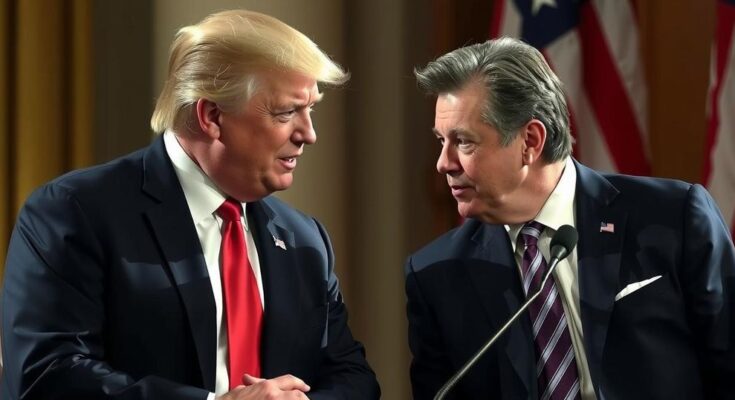Donald Trump is advocating for the use of recess appointments to fill key administration roles without Senate confirmation, a move supported by some conservatives like Elon Musk, but met with skepticism by others within the Republican Party. This raises significant concerns about the implications for the balance of power and the adherence to constitutional norms in governance.
As Donald Trump prepares for a potential return to the White House, he seeks the muscular authority of recess appointments—a maneuver that could allow him to bypass Senate confirmation entirely for key positions, including cabinet members and even a Supreme Court justice. This strategy is not without controversy; while some, like Elon Musk, firmly support it as a way to bring urgency and decisiveness to governance, critics warn it risks undermining the delicate system of checks and balances embedded in U.S. politics. Trump’s motivations boil down to efficiency in staffing a new administration, as historical delays in the confirmation process have hindered his past efforts. In his view, utilizing recess appointments is a tactical necessity to swiftly fill over 1,200 federal positions without the formalities that can slow down governance. Yet, dissent among Republicans hints that the route to employing such a strategy is fraught with challenges, requiring unanimous support among party members to even convene a recess. The ghost of past presidents echoes in this debate. Presidents, especially before World War II, relied on recess appointments due to the frequent absences of senators in Washington. Yet, as Senate protocols evolved, modern lawmakers have introduced pro-forma sessions to stymie such tactics, frustrated by attempts to sidestep traditional approval processes and checks on presidential power. Having been on the receiving end of political maneuvering himself, Trump must persuade a wary Republican base about the prudence of this strategy. Others challenge Trump’s approach as a dangerous precedent. Critics express concern that his pursuit of informal power undermines the foundational principles of constitutional governance. The National Review has gone on record saying Trump’s strategy is “wholly inappropriate,” a warning that such maneuvers could set a perilous standard for future administrations. Ensuing these actions may change the Senate’s operating norms permanently, leading to consequences that far outlast Trump’s potential term in office. Ultimately, this emerging power struggle encapsulates the tension between swift governance and adherence to constitutional norms. Trump’s ambition, encouraged by influential allies, poses questions about the future balance of power and whether expedient solutions are worth the erosion of established political protocols. As this narrative unfolds, the landscape of American governance may never be the same if such methods gain traction.
The debate over recess appointments highlights a significant intersection of political power, governance efficiency, and constitutional checks and balances. Historically, recess appointments enabled presidents to fill vacancies during Senate breaks, a practice rooted in the need for swift action in times of legislative inactivity. However, given the complexities of modern governance, the conversation has shifted towards how these appointments could erode legislative scrutiny and alter the relationship between the executive and legislative branches, especially under presidents like Trump and their influence on the Republican Party. As the Senate prepares for potential appointments, understanding this context sheds light on the complexities of the motivations and implications of Trump’s push for recess appointment power.
In summary, Trump’s push for expanded recess appointment powers encapsulates a broader debate within Republican circles about governance and authority. While some see it as a necessary method to expedite the filling of key government roles, critics fear it undermines the traditional checks and balances vital for a healthy democracy. As this power struggle unfolds, the ramifications extend beyond Trump’s administration, potentially reshaping the foundational principles surrounding the Senate’s advise-and-consent role and establishing precedents that could be exploited by future administrations.
Original Source: www.businessinsider.com



